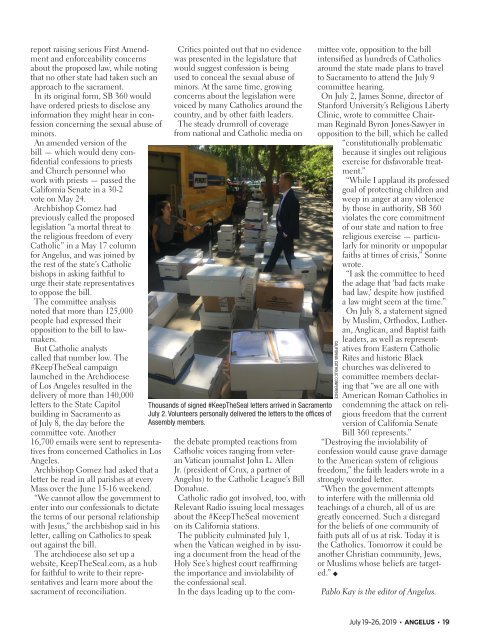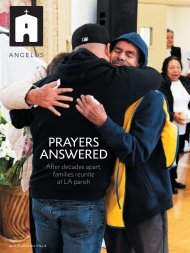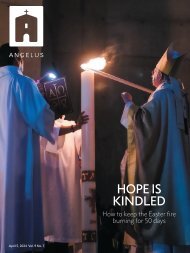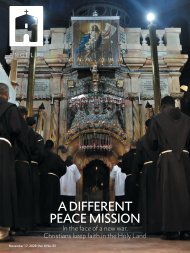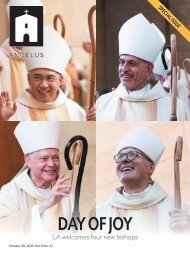Angelus News | July 19-26, 2019 | Vol. 4 No. 26
A 12th-century Byzantine mosaic depicts the Gospel story of Jairus asking Jesus to heal his dying 12-year-old daughter. For two millennia, the Catholic Church has been in the business of treating spiritual ailments — but that doesn’t mean it’s ignored people’s physical ailments. In fact, the world has Christianity and its founder to thank for some of the foundational principles of modern medicine. On Page 10, contributing editor Mike Aquilina tells the story of how the countercultural beliefs of early Christians led to one of society’s greatest inventions, the hospital. On Page 14, Angelus’ R.W. Dellinger tells the story of how a home hospice nurse is living out Jesus’ healing imperative by accompanying patients in their final moments.
A 12th-century Byzantine mosaic depicts the Gospel story of Jairus asking Jesus to heal his dying 12-year-old daughter. For two millennia, the Catholic Church has been in the business of treating spiritual ailments — but that doesn’t mean it’s ignored people’s physical ailments. In fact, the world has Christianity and its founder to thank for some of the foundational principles of modern medicine. On Page 10, contributing editor Mike Aquilina tells the story of how the countercultural beliefs of early Christians led to one of society’s greatest inventions, the hospital. On Page 14, Angelus’ R.W. Dellinger tells the story of how a home hospice nurse is living out Jesus’ healing imperative by accompanying patients in their final moments.
Create successful ePaper yourself
Turn your PDF publications into a flip-book with our unique Google optimized e-Paper software.
eport raising serious First Amendment<br />
and enforceability concerns<br />
about the proposed law, while noting<br />
that no other state had taken such an<br />
approach to the sacrament.<br />
In its original form, SB 360 would<br />
have ordered priests to disclose any<br />
information they might hear in confession<br />
concerning the sexual abuse of<br />
minors.<br />
An amended version of the<br />
bill — which would deny confidential<br />
confessions to priests<br />
and Church personnel who<br />
work with priests — passed the<br />
California Senate in a 30-2<br />
vote on May 24.<br />
Archbishop Gomez had<br />
previously called the proposed<br />
legislation “a mortal threat to<br />
the religious freedom of every<br />
Catholic” in a May 17 column<br />
for <strong>Angelus</strong>, and was joined by<br />
the rest of the state’s Catholic<br />
bishops in asking faithful to<br />
urge their state representatives<br />
to oppose the bill.<br />
The committee analysis<br />
noted that more than 125,000<br />
people had expressed their<br />
opposition to the bill to lawmakers.<br />
But Catholic analysts<br />
called that number low. The<br />
#KeepTheSeal campaign<br />
launched in the Archdiocese<br />
of Los Angeles resulted in the<br />
delivery of more than 140,000<br />
letters to the State Capitol<br />
building in Sacramento as<br />
of <strong>July</strong> 8, the day before the<br />
committee vote. Another<br />
16,700 emails were sent to representatives<br />
from concerned Catholics in Los<br />
Angeles.<br />
Archbishop Gomez had asked that a<br />
letter be read in all parishes at every<br />
Mass over the June 15-16 weekend.<br />
“We cannot allow the government to<br />
enter into our confessionals to dictate<br />
the terms of our personal relationship<br />
with Jesus,” the archbishop said in his<br />
letter, calling on Catholics to speak<br />
out against the bill.<br />
The archdiocese also set up a<br />
website, KeepTheSeal.com, as a hub<br />
for faithful to write to their representatives<br />
and learn more about the<br />
sacrament of reconciliation.<br />
Critics pointed out that no evidence<br />
was presented in the legislature that<br />
would suggest confession is being<br />
used to conceal the sexual abuse of<br />
minors. At the same time, growing<br />
concerns about the legislation were<br />
voiced by many Catholics around the<br />
country, and by other faith leaders.<br />
The steady drumroll of coverage<br />
from national and Catholic media on<br />
Thousands of signed #KeepTheSeal letters arrived in Sacramento<br />
<strong>July</strong> 2. <strong>Vol</strong>unteers personally delivered the letters to the offices of<br />
Assembly members.<br />
the debate prompted reactions from<br />
Catholic voices ranging from veteran<br />
Vatican journalist John L. Allen<br />
Jr. (president of Crux, a partner of<br />
<strong>Angelus</strong>) to the Catholic League’s Bill<br />
Donahue.<br />
Catholic radio got involved, too, with<br />
Relevant Radio issuing local messages<br />
about the #KeepTheSeal movement<br />
on its California stations.<br />
The publicity culminated <strong>July</strong> 1,<br />
when the Vatican weighed in by issuing<br />
a document from the head of the<br />
Holy See’s highest court reaffirming<br />
the importance and inviolability of<br />
the confessional seal.<br />
In the days leading up to the com-<br />
mittee vote, opposition to the bill<br />
intensified as hundreds of Catholics<br />
around the state made plans to travel<br />
to Sacramento to attend the <strong>July</strong> 9<br />
committee hearing.<br />
On <strong>July</strong> 2, James Sonne, director of<br />
Stanford University’s Religious Liberty<br />
Clinic, wrote to committee Chairman<br />
Reginald Byron Jones-Sawyer in<br />
opposition to the bill, which he called<br />
“constitutionally problematic<br />
because it singles out religious<br />
exercise for disfavorable treatment.”<br />
“While I applaud its professed<br />
goal of protecting children and<br />
weep in anger at any violence<br />
by those in authority, SB 360<br />
violates the core commitment<br />
of our state and nation to free<br />
religious exercise — particularly<br />
for minority or unpopular<br />
faiths at times of crisis,” Sonne<br />
wrote.<br />
“I ask the committee to heed<br />
the adage that ‘bad facts make<br />
bad law,’ despite how justified<br />
a law might seem at the time.”<br />
On <strong>July</strong> 8, a statement signed<br />
by Muslim, Orthodox, Lutheran,<br />
Anglican, and Baptist faith<br />
CALIFORNIA CATHOLIC CONFERENCE<br />
leaders, as well as representatives<br />
from Eastern Catholic<br />
Rites and historic Black<br />
churches was delivered to<br />
committee members declaring<br />
that “we are all one with<br />
American Roman Catholics in<br />
condemning the attack on religious<br />
freedom that the current<br />
version of California Senate<br />
Bill 360 represents.”<br />
“Destroying the inviolability of<br />
confession would cause grave damage<br />
to the American system of religious<br />
freedom,” the faith leaders wrote in a<br />
strongly worded letter.<br />
“When the government attempts<br />
to interfere with the millennia old<br />
teachings of a church, all of us are<br />
greatly concerned. Such a disregard<br />
for the beliefs of one community of<br />
faith puts all of us at risk. Today it is<br />
the Catholics. Tomorrow it could be<br />
another Christian community, Jews,<br />
or Muslims whose beliefs are targeted.”<br />
<br />
Pablo Kay is the editor of <strong>Angelus</strong>.<br />
<strong>July</strong> <strong>19</strong>-<strong>26</strong>, 20<strong>19</strong> • ANGELUS • <strong>19</strong>


